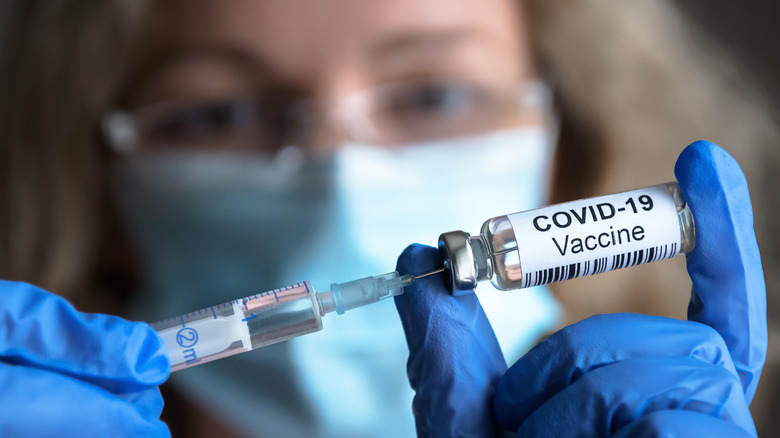The Biggest Differences Between The COVID-19 Vaccine And Other Vaccines
It's been nearly six months, as of publication, since United States citizens began receiving vaccinations for COVID-19 — namely Pfizer, Moderna, and Johnson & Johnson shots — and with each passing day, more research is completed and more data is compiled on these vaccinations. We're of course not strangers to the idea of vaccinations. After all, we have the option to take flu shots annually, but what exactly makes COVID-19's vaccines different from other jabs?
The flu shots we get every year inject small parts of various flu strains so that the body can become familiar with them and know to reject them if they're encountered in everyday life (via CBC). Like any other sickness, though, you can still get the flu after receiving the flu shot, but your body will understand the proper way to handle it. CBC also noted that scientists create a new version of the flu shot every year because, like any virus, the flu virus itself is always mutating.
The biggest difference, then, between the COVID-19 vaccines and other vaccines is the lack of viral introduction to the body. The COVID-19 vaccines do not contain any live coronavirus strains in them, unlike the flu vaccines. Have more questions? We've got all the answers.
Here's how the vaccines work without injecting COVID-19 into you
COVID-19 vaccines don't contain coronavirus strains because they are messenger rna (mRNA) vaccines. Instead of introducing the virus to the body, mRNA vaccines trigger the body through a message sent by the "messenger" to create a certain protein that can combat the virus for which that vaccine was created (via Centers for Disease Control and Prevention). Then, the body produces antibodies to fight the new foreign protein that has been built. Finally, the new antibodies defeat the protein, become aware of how to fight this protein and, consequently, COVID-19 — and all without injecting the virus into the body.
The CDC also explains that mRNA vaccines have been worked on for decades, despite being newly employed for usage on the public. However, only Pfizer and Moderna's vaccines are mRNA vaccines. Johnson & Johnson's vaccine is a carrier vaccine, meaning the shot injects a harmless virus into the body (via Yale Medicine). This virus carries instructions that tells your body to build a COVID-19 spike protein, and similarly to mRNA vaccines, the body learns how to defend itself by fighting off this protein. Yale Medicine notes that the carrier virus won't make you sick, but the COVID-19 protein, once built, can have small side effects.
Ultimately, the big difference is that no COVID-19 vaccine contains actual coronavirus strains in it. If you have questions about the differences between the COVID-19 vaccines themselves, here are all the answers you're looking for.

